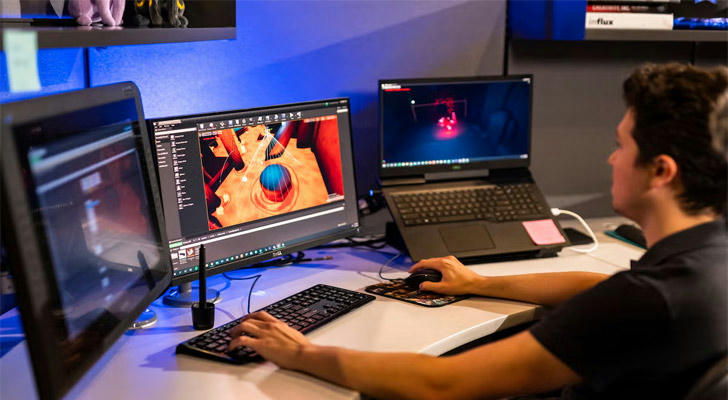Why You Should Consider Taking a Video Game Design Course
Video games combine creativity, technology, and storytelling, and if you’ve ever wanted to make your own, a video game design course can turn your passion into a career. These courses teach the essential skills needed to create games—from coding to design to narrative development. Whether you dream of making a career out of your favorite pastime or just want to understand how the games you love are made, taking a course in game design is the perfect first step.

What is a Video Game Design Course?
A video game design course is a structured program that provides comprehensive training in the various elements of game creation. From the foundational knowledge of game mechanics to the more advanced concepts of programming and 3D modeling, these courses give you the skills needed to build and design games. Key areas covered include:
Game Mechanics: Understanding how gameplay works, how levels are structured, and what makes a game fun and engaging.
Storytelling: Crafting compelling narratives, characters, and settings that immerse players in the game world.
Programming: Learning programming languages like C++, and tools such as Unity and Unreal Engine to bring your ideas to life.
3D Modeling and Animation: Designing the visual elements of the game, including characters, environments, and animations.
Institutions like Full Sail University, SCAD, and online platforms like Coursera offer programs for all levels of interest and experience—whether you're looking for a degree or simply want to develop new skills.

Why Should You Take a Video Game Design Course?
1. Turn Your Passion into a Career
If you're an avid gamer, why not create your own games? A video game design course can provide the skills to transition from player to creator. This is your opportunity to understand the intricate world behind the games you love. Whether you aim to work for a major studio or develop indie games, these courses give you the tools to make that dream a reality.
John, for example, completed a Full Sail University game design course, learned Unreal Engine, and now works as a level designer at an indie studio. Programs like Full Sail help students get their foot in the door fast, with 60% of graduates securing industry roles within just six months of graduation.
2. Develop Both Technical and Creative Skills
One of the most exciting things about game design is that it combines both technical skills and creativity. As a game designer, you’ll need to learn how to code, design game mechanics, build immersive worlds, and tell meaningful stories—all while using state-of-the-art software.
Sophia, a literature graduate, took an online Coursera course and integrated her storytelling skills into her game design. Her project, which focused on emotional storytelling and character development, won an award at the Global Game Jam, proving that creativity and technical skills are equally important in the world of game design.
In a game design course, you’ll learn to use tools like Unity, Unreal Engine, and Blender, giving you hands-on experience with the same platforms used by top studios like EA and Ubisoft.
3. Stand Out in a Competitive Industry
The gaming industry is massive, generating over $60 billion in revenue in the U.S. alone in 2023, and there are 2.7 billion gamers worldwide. With this booming growth, competition for jobs in game design is fierce. But a game design course can give you a significant advantage. It equips you with the technical skills and practical knowledge needed to stand out in this highly competitive field.
Matt, a graduate from USC, used his final project—a puzzle game built in Unity—to secure an internship at Electronic Arts (EA). His portfolio, which showcased his ability to integrate solid design and code, made him an attractive candidate. Graduates from top programs like USC and SCAD often go on to work at big-name studios like Bethesda and Riot Games, giving you a head start in securing industry roles.
Moreover, these programs offer valuable networking opportunities. Many schools partner with industry giants to provide students with direct access to professionals and employers, which can be the key to landing your first role in the gaming industry.
4. Access Industry Tools and Resources
One of the biggest advantages of taking a formal video game design course is the access it provides to expensive, industry-standard tools. Professional game engines like Unity and Unreal Engine can be costly to learn on your own, but many programs provide free or discounted access to these tools, as well as expert guidance in using them.
Some schools, like SCAD, even host Game Design Expos, where students can showcase their work to industry professionals, network with potential employers, and gain exposure in the field. These events can be pivotal in making the right connections and opening doors to career opportunities.
5. Build a Strong Portfolio
In game design, your portfolio is your best asset. Through a video game design course, you’ll have the opportunity to build a variety of projects—ranging from small prototypes to fully developed games—that demonstrate your abilities and creativity. Having a solid portfolio is crucial in getting hired in the industry.
Alex, a SCAD graduate, showcased his action-adventure game at a Game Design Expo. His project was picked up by Gamasutra, leading to a job offer from Square Enix. A strong portfolio helps you stand out from other candidates and makes a lasting impression on potential employers.

How to Choose the Right Course?
When selecting a video game design course, it's important to consider your skill level, career goals, and preferred learning environment. Here are some options to consider:
1.For Beginners: Schools like Worcester Polytechnic Institute and the University of Utah offer solid, well-rounded programs. These universities provide a mix of technical and creative coursework that sets students up for success in the industry.
2.For Flexibility: Online platforms like Coursera, Udemy, and edX offer affordable, self-paced courses. These courses are great if you’re looking to learn at your own speed or need something more budget-friendly. However, they may not provide the same level of direct industry exposure as traditional degree programs.
3.For Career-Focused Programs: For a more intensive experience, top-tier programs like USC and SCAD offer comprehensive curricula, mentorship, and career networking opportunities. These programs tend to be more expensive but are known for producing graduates who land jobs at major studios.

Conclusion
A video game design course is more than just learning how to make games—it’s about developing the technical and creative skills you need to shape the future of gaming. Whether you want to design for a large studio or create your own indie games, these courses give you the tools, knowledge, and experience to succeed in an ever-evolving industry.
From learning to code and create immersive worlds to building a professional portfolio and gaining valuable industry connections, a game design course prepares you for a career in one of the most exciting fields out there. If you’ve ever dreamed of making the next big game, a game design course is the first step toward making that dream a reality.
